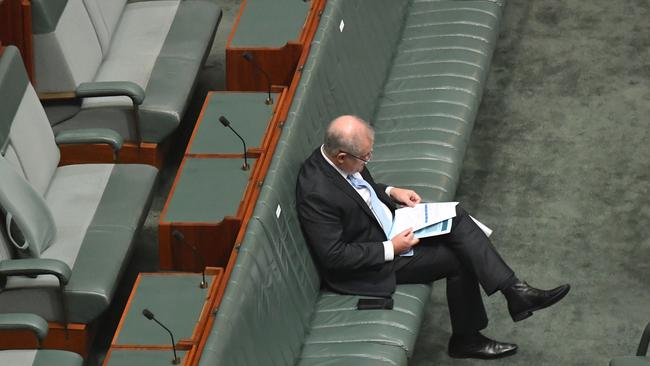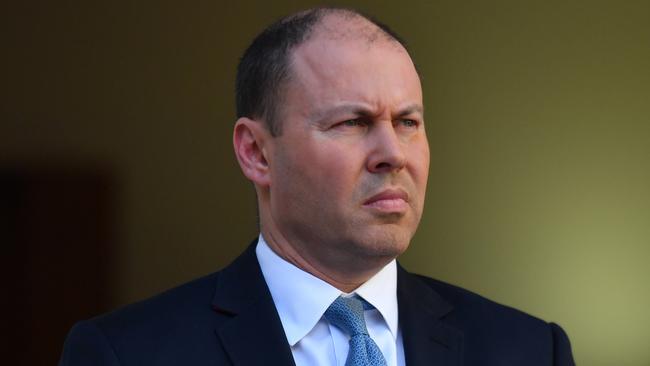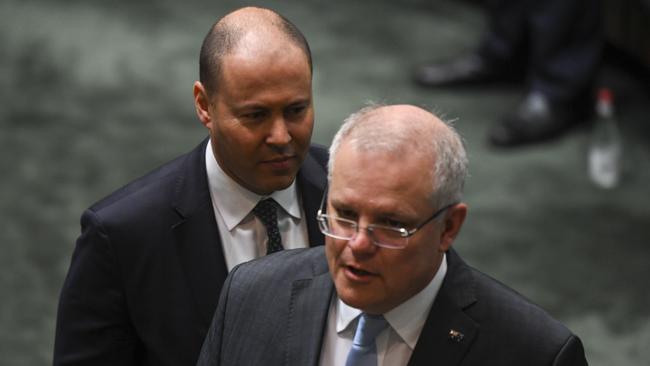Peta Credlin: Australian economy could be impacted by coronavirus for decades
While the Prime Minister manages this once in a lifetime crisis, it’s now up to other party players to step up to ease the load. If they don’t, we may not ever get out of this, writes Peta Credlin.
Rendezview
Don't miss out on the headlines from Rendezview. Followed categories will be added to My News.
Without our social distancing rules, Health Minister Greg Hunt warned, the risk always was that coronavirus might have infected 15 million Australians, hospitalised 1.5 million and killed around 150,000 people.
That’s why it’s been necessary to stop sport, close down restaurants and cafes, virtually ban travel, and have everyone who can, work from home.
But with probably the fastest drop in GDP and the fastest rise in unemployment in history – and with the federal government’s finances rocketing towards $100 billion dollar deficits and $1 trillion of debt – it’s going to be absolutely vital that, when this is over, our economy’s top speed is much higher than it’s been. Otherwise, a relatively short-term health crisis could become a long-term economic crisis – a new Great Depression that could easily dog our country for a generation.
I don’t like the argument that coronavirus ‘only’ kills older citizens so why sacrifice young people’s economic future to keep alive seniors who probably only have a few years left. To start with, it’s not true that COVID-19 doesn’t hurt prime age people – as Boris Johnson’s brush with death shows, and countless other younger people here, and overseas.

Then there’s the fact that a decent society honours the wisdom of the old and protects its most vulnerable; that at this time of Easter, we haven’t become a country where health care is denied any Australian who needs it to survive.
Look at places like New York, where a modern health system is straining to breaking point because strict precautions were not put in place early, and kept there, until danger had passed. So as much as it might constrain our freedom and hit the bottom line, I support the government’s efforts to manage the calamity of a self-induced economic crisis brought on by a health pandemic.
But.
I know how government works and we all know its tendency to fixate on the crisis of the moment to the exclusion of all else. With an increasingly presidential system, when the prime minister is focused on one thing, the risk is that nothing-much else gets done. That’s in part because the processes that feed the system have become so gummed up that unless this subcommittee or that ticks off a decision, it doesn’t happen; and given the PM chairs most of them of them anyway, it all grinds to a halt when he’s off fighting coronavirus, or stopping the boats, as was the example in my time.

Gone are the days when ministers took charge of their own portfolios. Gone are the days when ministers took advice from departments, but made decisions on their desk. Sadly, too often they want or expect the ‘right’ answer to be given to them so that if it doesn’t work out, they can’t be held to blame; but invariably, there is no ‘right’ answer and decisions come down to good judgment.
Good judgment? You either have it, or you don’t.
Work ethic too.
Right now, excluding ministers like Josh Frydenberg, Greg Hunt, Mathias Cormann and Karen Andrews on the frontline, what are the rest of the Morrison Government ministers doing while their boss is battling the coronavirus scourge and how prepared are they for the work they’ll need to do given the lessons this pandemic has taught us already?
When this is over, for instance, we clearly can’t remain as dependent on China as we have become for almost every aspect of our economy, be it universities, tourism or manufacturing, or subservient in other areas, where they can own here, what we can’t own in their country.

Even the very limited pharmaceutical manufacturing that remains in Australia, to take just one example, is almost entirely reliant on components and raw materials from China or India. But if we are to be capable of self-reliance in a crisis – and we have surely now realised just how quickly and how unexpectedly a crisis can materialise – we need to do something to revive our manufacturing sector that has shrunk from over 20 per cent of our economy to under 10 per cent in a generation.
To his credit, Scott Morrison is now stressing a coming struggle for sovereignty. But saying we must change is a world away from actually making it happen. And to get manufacturing back in Australia, in a meaningful way, we need to understand why so much of it left in the first place.
In simple terms, the two biggest inputs into manufacturing in Australia are labour (wages) and energy (the cost of power).
On labour, we will never be able to outbid nations to the north of us when it comes to price and we should never be a place where workers aren’t paid a fair salary, but surely we can start thinking about reforming the suffocating rules that the award system still places on what particular workers can actually do; and trades training and apprenticeships too? Given the recent corona-collaborations between the ACTU and the Industrial Relations minister, why can’t this willingness to constructively engage continue?

On Energy? Well that’s a no-brainer. If there’s one thing that coronavirus has done is that it’s given the climate warriors the ‘emergency’ they’ve been protesting for. You want to know what a real life and death crisis looks like? Here it is. You want to know what shutting down the economy looks like? Here it is. Surely this must then lead to a radical rethink of energy policy in this country and our mad desire to shut down our (homegrown) advantage in the generation of baseload electricity (coal, gas, uranium too), in preference to more (Chinese imported) solar panels and (foreign owned) wind turbines?
Which gets me back to the ministers sitting back in their offices, a long way from the frontline, while their prime minister is deep in the coronavirus fight.
Right now, all of them have a job to do to rethink the direction of policy in their portfolios, coming out of this crisis. Beavering away behind the scenes, I hope there’s at least a few of them doing the heavy intellectual work that’s needed for our country to learn from this crisis and do better. Scott Morrison can’t be thinking about all of these big questions now, but others need to be, because this corona crisis will be over soon enough and when it is, we cannot just go back to business as usual.
Come Budget day (now shifted to October), and every other Budget day for the coming decade – there will be a real reckoning.
Now that we’ve spent the billions, how ready are we to pay them back?

